Sunday, May 30, 2010
Saturday, May 29, 2010
Haunting Images from the Oil Spill
*heavy sighs* :o(
Shrimp boats equipped with booms collect oil in Chandeleur Sound, La., on May 5. (AP Photo/Eric Gay)
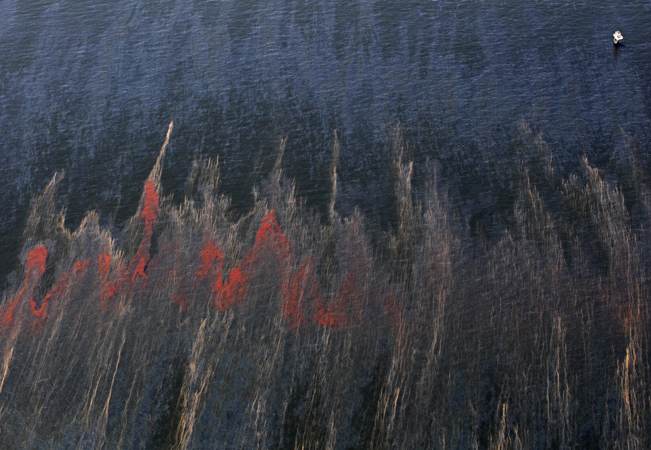
Oil moves past an oil rig, top right, in Chandeleur Sound on May 5. (AP Photo/Eric Gay)
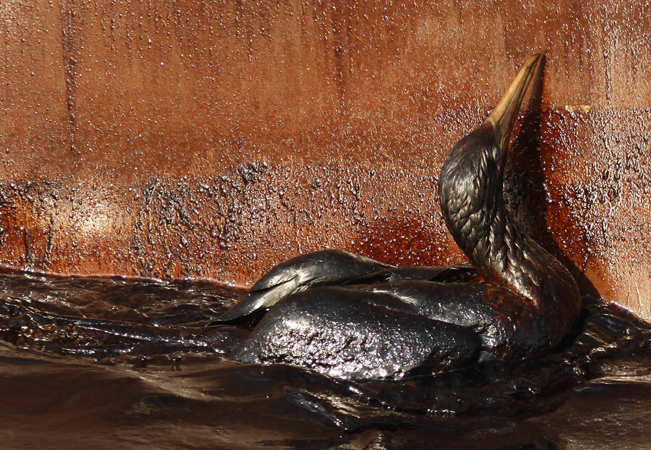
An oil-soaked bird struggles against the side of an Iron Horse supply vessel at the site of the oil spill off Louisiana on May 9. (AP Photo/Gerald Herbert)
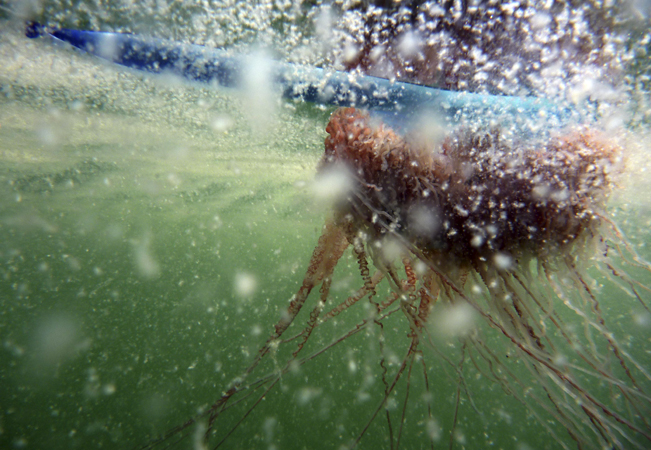
A Portuguese man-of-war is seen from under the oily water in Chandeleur Sound on May 6. (AP Photo/Alex Brandon)
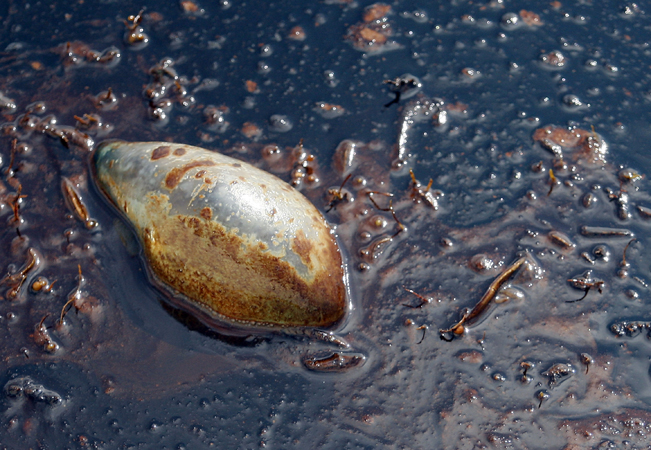
A dead jellyfish floats amid oil May 6 in the Gulf of Mexico, southwest of the Southwest Pass of the Mississippi River on the coast of Louisiana. (AP Photo/Patrick Semansky)
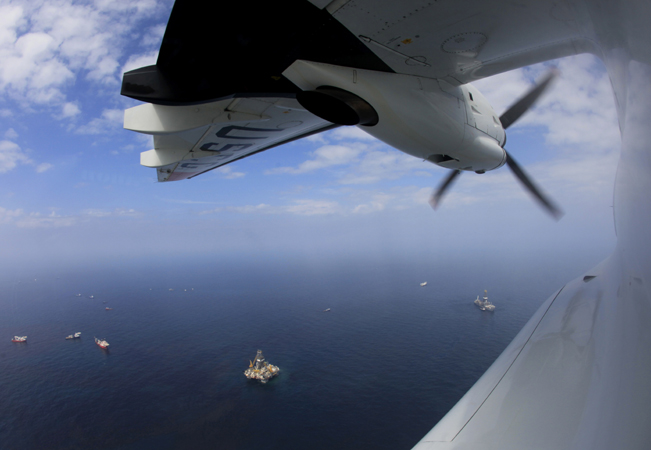
A Coast Guard plane flies over the Development Driller III oil drilling platform, which was drilling a relief well May 12 at the site of the Deepwater Horizon oil spill. (AP Photo/Charlie Riedel)
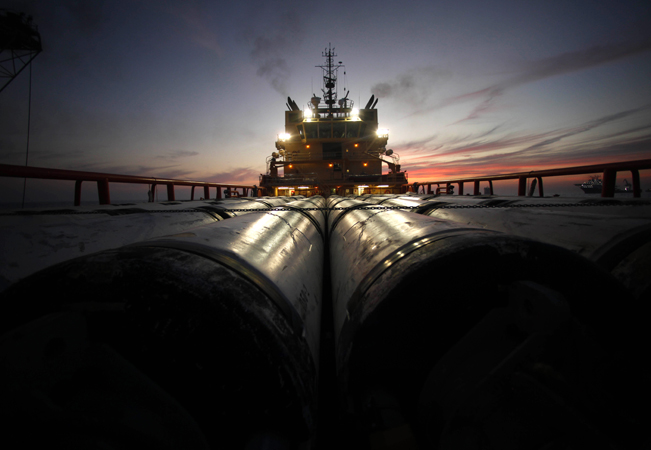
Risers, the outer casings of oil drill pipes, are seen on the deck of the service vessel Joe Griffin as it prepares to head to Port Fourchon, La., on May 11. (Pool Photo/Gerald Herbert)
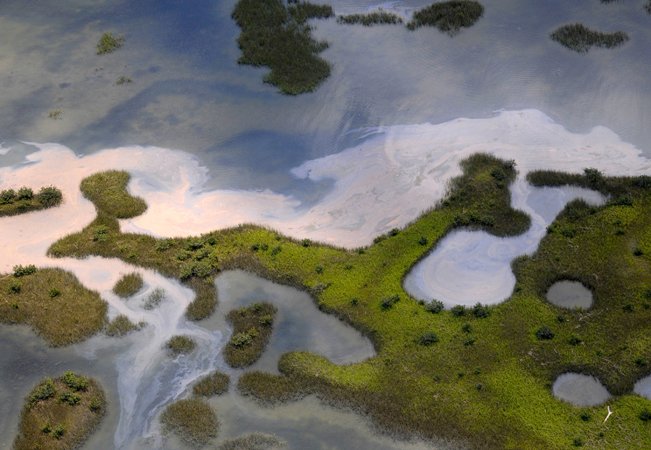
An aerial view of the northern Chandeleur barrier islands, 20 miles from the main Louisiana coastline, shows sheens of oil reaching land May 6. (AP Photo/David Quinn)
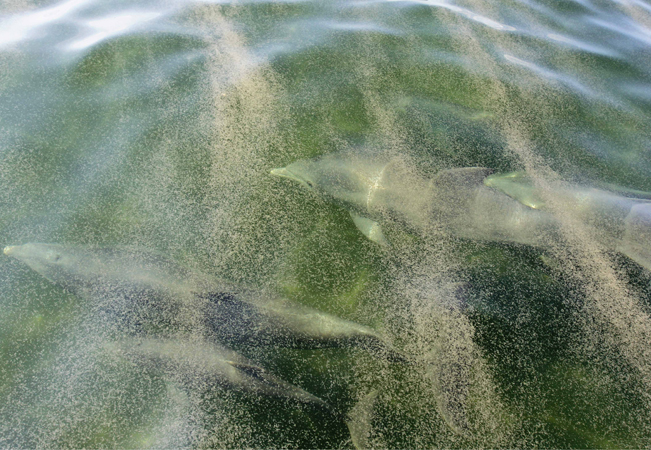
A pod of bottlenose dolphins swims in the oily water of Chandeleur Sound on May 6. Five days later, six dead dolphins were found along the Gulf Coast. Officials were investigating oil's role in the deaths. (AP Photo/Alex Brandon)
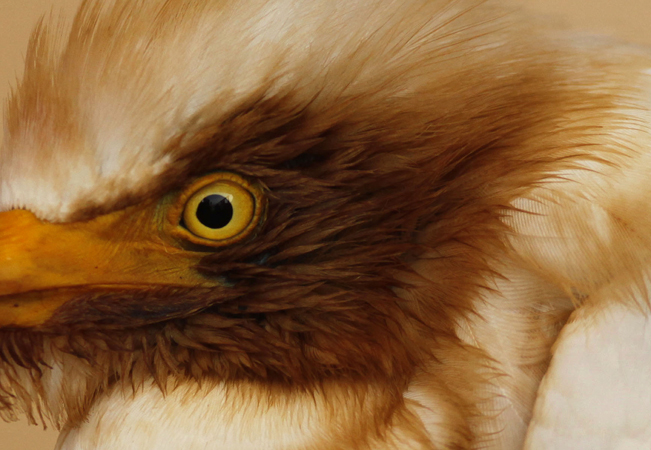
An oil-stained cattle egret is seen on the deck of the Joe Griffin supply vessel May 9. (AP Photo/Gerald Herbert)
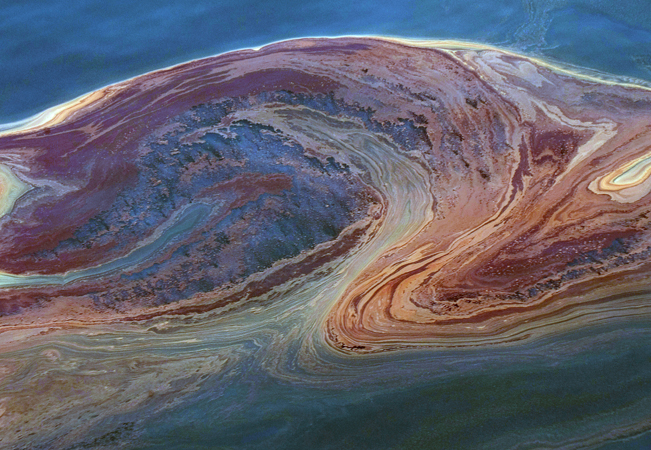
Oil swirls in the Gulf of Mexico currents May 6. (AP Photo/Dave Martin)
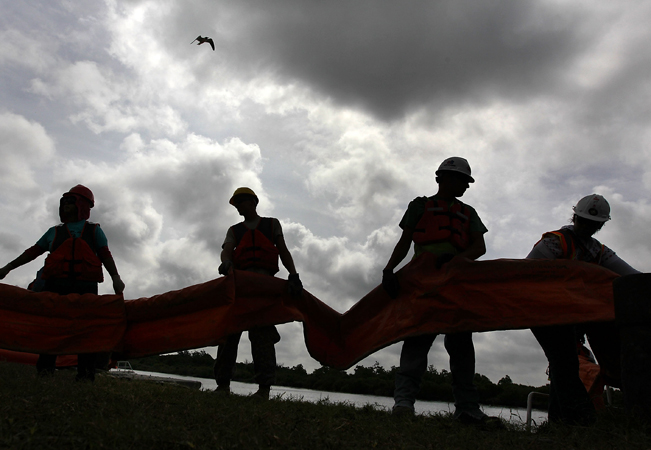
Contractors unload oil booms to protect marshlands May 13 in Hopedale, La. (John Moore/Getty Images)
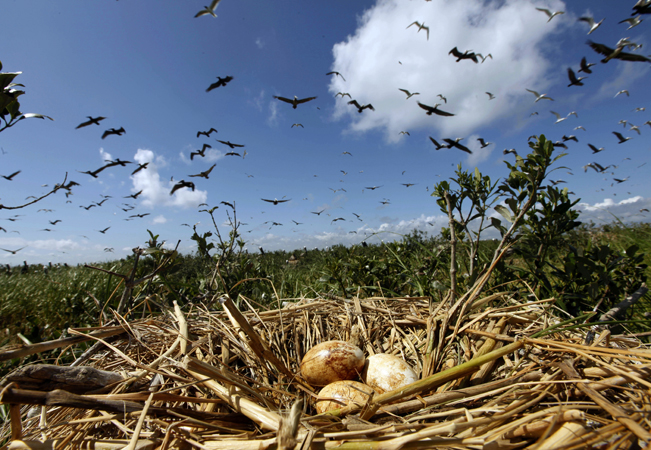
Pelicans fly past a nest of eggs apparently stained with oil on a Louisiana island May 22. The island is home to hundreds of brown pelican nests as well as terns, gulls and roseated spoonbills. (AP Photo/Gerald Herbert)
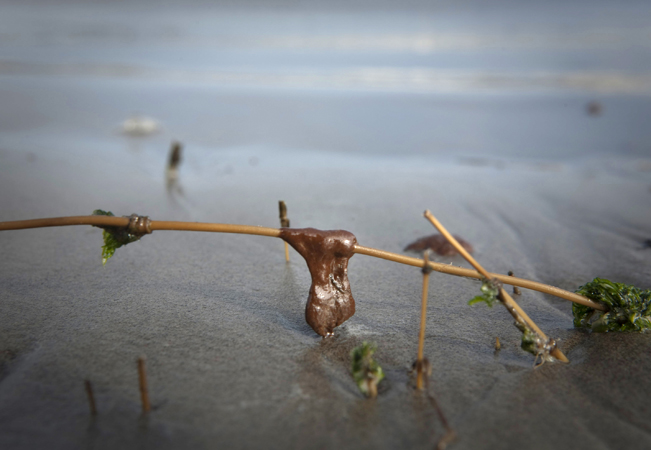
A glob of oil thought to be from the massive oil spill in the Gulf of Mexico sits on a reed on a beach in Southwest Pass, La., on May 15. (Reuters/Lee Celano)
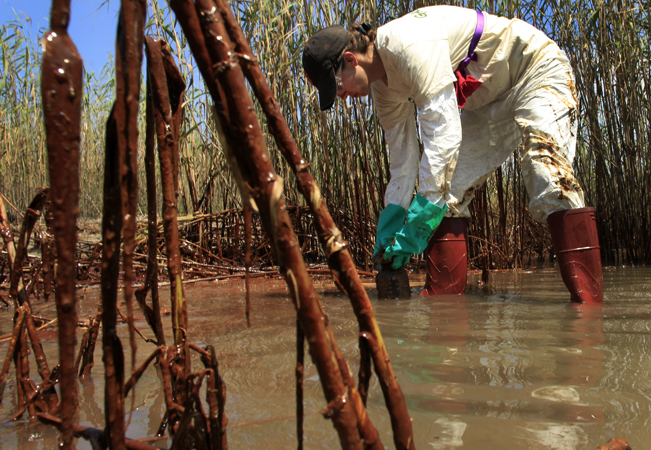
A Greenpeace worker collects samples of oil May 19 that washed up along the mouth of the Mississippi River near Venice, La. (AP Photo/Charlie Riedel)
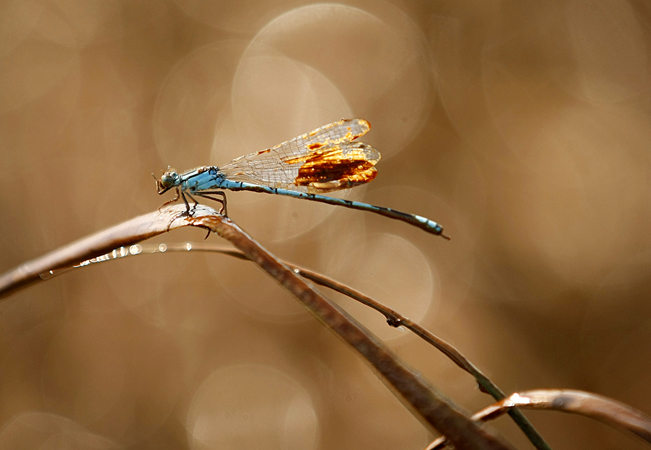
An oil-covered dragonfly, stuck to marsh grass, tries to clean itself May 18 in Garden Island Bay near Venice. (AP Photo/Gerald Herbert)
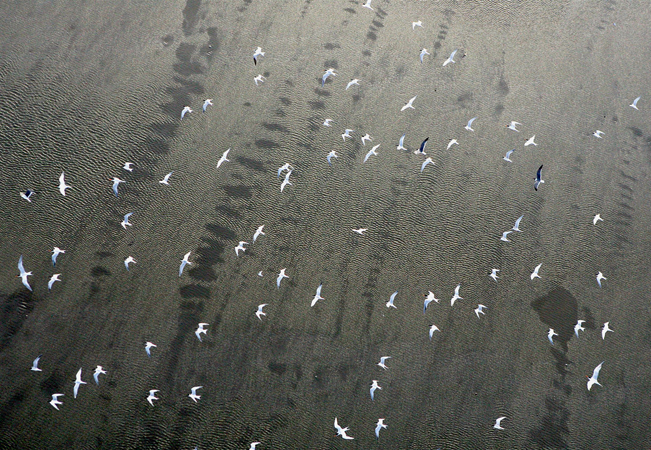
Birds fly over oil on the water April 29 near Breton Sound Island, on the southernmost tip of the Chandeleur Islands. (Reuters/Sean Gardner/?Greenpeace/?Handout)?
Shrimp boats equipped with booms collect oil in Chandeleur Sound, La., on May 5. (AP Photo/Eric Gay)

Oil moves past an oil rig, top right, in Chandeleur Sound on May 5. (AP Photo/Eric Gay)

An oil-soaked bird struggles against the side of an Iron Horse supply vessel at the site of the oil spill off Louisiana on May 9. (AP Photo/Gerald Herbert)

A Portuguese man-of-war is seen from under the oily water in Chandeleur Sound on May 6. (AP Photo/Alex Brandon)

A dead jellyfish floats amid oil May 6 in the Gulf of Mexico, southwest of the Southwest Pass of the Mississippi River on the coast of Louisiana. (AP Photo/Patrick Semansky)

A Coast Guard plane flies over the Development Driller III oil drilling platform, which was drilling a relief well May 12 at the site of the Deepwater Horizon oil spill. (AP Photo/Charlie Riedel)

Risers, the outer casings of oil drill pipes, are seen on the deck of the service vessel Joe Griffin as it prepares to head to Port Fourchon, La., on May 11. (Pool Photo/Gerald Herbert)

An aerial view of the northern Chandeleur barrier islands, 20 miles from the main Louisiana coastline, shows sheens of oil reaching land May 6. (AP Photo/David Quinn)

A pod of bottlenose dolphins swims in the oily water of Chandeleur Sound on May 6. Five days later, six dead dolphins were found along the Gulf Coast. Officials were investigating oil's role in the deaths. (AP Photo/Alex Brandon)

An oil-stained cattle egret is seen on the deck of the Joe Griffin supply vessel May 9. (AP Photo/Gerald Herbert)

Oil swirls in the Gulf of Mexico currents May 6. (AP Photo/Dave Martin)

Contractors unload oil booms to protect marshlands May 13 in Hopedale, La. (John Moore/Getty Images)

Pelicans fly past a nest of eggs apparently stained with oil on a Louisiana island May 22. The island is home to hundreds of brown pelican nests as well as terns, gulls and roseated spoonbills. (AP Photo/Gerald Herbert)

A glob of oil thought to be from the massive oil spill in the Gulf of Mexico sits on a reed on a beach in Southwest Pass, La., on May 15. (Reuters/Lee Celano)

A Greenpeace worker collects samples of oil May 19 that washed up along the mouth of the Mississippi River near Venice, La. (AP Photo/Charlie Riedel)

An oil-covered dragonfly, stuck to marsh grass, tries to clean itself May 18 in Garden Island Bay near Venice. (AP Photo/Gerald Herbert)

Birds fly over oil on the water April 29 near Breton Sound Island, on the southernmost tip of the Chandeleur Islands. (Reuters/Sean Gardner/?Greenpeace/?Handout)?
Gulf oil spill: White House orders BP to cut use of dispersant by half!
Gulf oil spill: White House orders BP to cut use of dispersant by half 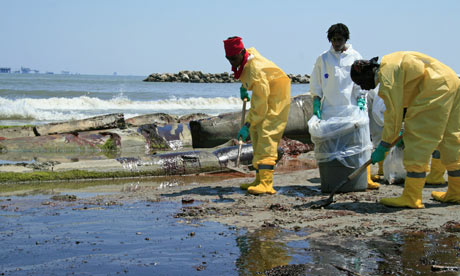 The White House directed BP to cut its use of chemical dispersants to break up the Louisiana oil slick by as much as 50% yesterday, reflecting concerns that the clean-up of the spill could be worsening the economic disaster in the Gulf of Mexico.
The White House directed BP to cut its use of chemical dispersants to break up the Louisiana oil slick by as much as 50% yesterday, reflecting concerns that the clean-up of the spill could be worsening the economic disaster in the Gulf of Mexico.
Lisa Jackson, the head of the Environmental Protection Agency, said the Obama administration wanted the oil company to scale back its use of chemicals on the water surface. The order came amid increasing tension between the administration and the oil company about how to manage the oil on the ocean floor, more than a month after the sinking of the Deepwater Horizon oil rig.
"I am recommending as strongly as we can that we absolutely minimise the use of dispersants and that we monitor as rigorously as we can," she told a conference call with reporters touring Louisiana marshes contaminated by the oil. She said she thought BP would be able to cut its use of chemicals to break up the spill by half or even 75% by injecting smaller quantities underwater.
The directive is in line with a hardening of administration's rhetoric against BP. With thick brown sheets of crude oil now washing up on shore, the White House – as well as the oil company – is feeling the pressure of not stopping the leak.
Louisiana's governor, Bobby Jindal, said he had warned the administration for days that the booms deployed by BP would not keep back the oil. He has said some 65 miles of Louisiana's coastline is affected, contaminating oyster beds and coating pelicans and sea turtles in oil. Independent scientists and members of Congress have also been warning about BP's heavy reliance on a dispersant called Corexit which is banned in the UK because it is harmful for marine life.
BP has poured more than 650,000 gallons of the chemical on to the spill. Scientists told congressional hearings last week that Corexit was more toxic and less effective than other dispersants on the market. Conservationists fear the chemical could further jeopardise already depleted stocks of fish such as Atlantic bluefin tuna or poison endangered species of turtle.
The Centre for Biological Diversity petitioned the Obama administration yesterday to protect the bluefin tuna as an endangered species. The move would compel the administration to consider the consequences of offshore drilling before sanctioning any more oil rigs.
Jackson directed the EPA last week to seek out alternative chemicals within 24 hours, but admitted yesterday that BP had continued to use Corexit to break up the spill.
She and the coast guard commander, Mary Landry, defended the use of the chemical, arguing it had prevented a more devastating landfall of heavy crude.
But she admitted the longterm consequences of using enormous quantities of the chemical over such a long period of time were unresolved. "It is clear to me that the science of dispersants has not in any way kept up with our ability to drill and use fossifl fuels and that is a huge disconnect," she said.
Worries escalate over effect of Corexit on marine wildlife

BP faces criticism over the chemicals it is using to disperse the oil slick. Photograph: Stephane Jourdain/AFP/Getty Images
Lisa Jackson, the head of the Environmental Protection Agency, said the Obama administration wanted the oil company to scale back its use of chemicals on the water surface. The order came amid increasing tension between the administration and the oil company about how to manage the oil on the ocean floor, more than a month after the sinking of the Deepwater Horizon oil rig.
"I am recommending as strongly as we can that we absolutely minimise the use of dispersants and that we monitor as rigorously as we can," she told a conference call with reporters touring Louisiana marshes contaminated by the oil. She said she thought BP would be able to cut its use of chemicals to break up the spill by half or even 75% by injecting smaller quantities underwater.
The directive is in line with a hardening of administration's rhetoric against BP. With thick brown sheets of crude oil now washing up on shore, the White House – as well as the oil company – is feeling the pressure of not stopping the leak.
Louisiana's governor, Bobby Jindal, said he had warned the administration for days that the booms deployed by BP would not keep back the oil. He has said some 65 miles of Louisiana's coastline is affected, contaminating oyster beds and coating pelicans and sea turtles in oil. Independent scientists and members of Congress have also been warning about BP's heavy reliance on a dispersant called Corexit which is banned in the UK because it is harmful for marine life.
BP has poured more than 650,000 gallons of the chemical on to the spill. Scientists told congressional hearings last week that Corexit was more toxic and less effective than other dispersants on the market. Conservationists fear the chemical could further jeopardise already depleted stocks of fish such as Atlantic bluefin tuna or poison endangered species of turtle.
The Centre for Biological Diversity petitioned the Obama administration yesterday to protect the bluefin tuna as an endangered species. The move would compel the administration to consider the consequences of offshore drilling before sanctioning any more oil rigs.
Jackson directed the EPA last week to seek out alternative chemicals within 24 hours, but admitted yesterday that BP had continued to use Corexit to break up the spill.
She and the coast guard commander, Mary Landry, defended the use of the chemical, arguing it had prevented a more devastating landfall of heavy crude.
But she admitted the longterm consequences of using enormous quantities of the chemical over such a long period of time were unresolved. "It is clear to me that the science of dispersants has not in any way kept up with our ability to drill and use fossifl fuels and that is a huge disconnect," she said.
Friday, May 21, 2010
Tuesday, May 18, 2010
Bottle recycling ~ I don't think so!
Bottle Recycling? That is a misnomer for sure. The plastic bottles that we, meaning the USA are supposedly bringing to centers for recycling are not in fact used for anything here in this country. The bottles are shipped to China where they are made in to clothing, rugs and all sorts of items that are then sent back to us for purchasing. How the heck does that make any sense what so ever? The US uses crude for making the bottles in the first place and rather than making the old bottles in to more bottles we seem to prefer making the new ones out of resources such as oil! This countries dependency on oil must stop. This is one way it could easily be slowed down!!
Tuesday, May 11, 2010
Sunday, May 9, 2010
Subscribe to:
Comments (Atom)